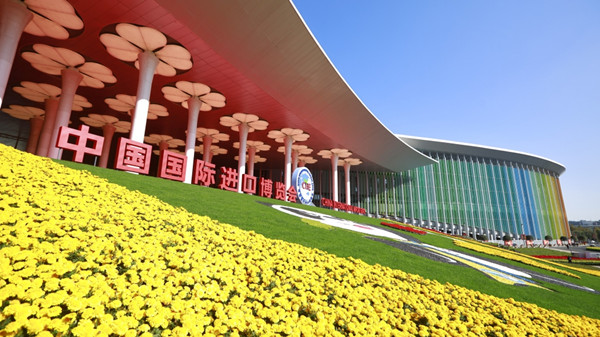
The National Exhibition and Convention Center (Shanghai), host venue for the China International Import Expo in Shanghai. [Photo provided to chinadaily.com.cn]
China's northeast Liaoning province is making progress in attracting investment and boosting foreign trade thanks to its ideal location and industrial strengthens, according to leaders of foreign companies that have signed up for the fourth China International Import Expo.
The CIIE attendees participated in a media conference at an investment promotion event for the fourth CIIE held in Shenyang, capital of Liaoning, on Thursday and expressed their confidence in Liaoning's high-quality development.
"Liaoning is one of granaries for China and plays a significant role in China's food security. Therefore, Liaoning is a place that cannot be ignored by practitioners involved in the food industry," said Jiao Yan, vice-president of Louis Dreyfus Company North Asia.
Louis Dreyfus Company's business in China started in 1973. In 2005, it became the first wholly foreign-owned enterprise approved by the Chinese government to engage in agricultural trade in China.
In 2019, it set up storage facilities in Jinzhou, a city in Liaoning province, to better facilitate the company's operation in the trade, warehousing and logistics for agricultural commodities in North China. The commodities cover corn, wheat and soybeans.
"Agricultural commodities belong to bulk product in which logistics plays a key role in the trade. By establishing diverse logistics and storage channels, we cut down the cost and improved the efficiency of logistics," Jiao said. The Jinzhou warehouse is recognized as a major hub by the company in the transportation of grain and the supply of soybean meal. The company will continue to expand its business scope and investment in Liaoning and give better play to its role in connecting the three northeastern provinces, Jiao said.
Louis Dreyfus Company has participated in the CIIE for four consecutive years since 2018. At the fourth CIIE, the company will set up a 150 square-meter booth to display a handful of new products covering vegetable oil, fruit juice, coffee, grain and pet food. A virtual gallery will also be open in its booth to let visitors better understand their business, culture and history.
"The expo not only allows us to showcase the company's current and future development, but also becomes a window to release new products, to learn more about the market and to seize the opportunity to lead the market," Jiao said.
Boehringer Ingelheim, a research-driven pharmaceutical company with 130 years of experience, is another foreign company that participated in the event.
"Boehringer Ingelheim has noticed that Liaoning is endowed with a bountiful animal husbandry industry with a well-established industrial foundation," said Yin Yuhan, vice-president of the communication, public and government affairs department at Boehringer Ingelheim Greater China.
"Therefore, Liaoning has great potential and development opportunities for a company majoring in the businesses of human and animal health like us. We look forward to exploring more cooperation here in the future," Yin added.
This year marks the third year for Boehringer Ingelheim to participate in the CIIE. As a frequent participant, the company takes it as a good opportunity to display the recent achievements in its human medicine, animal health and biopharmaceutical businesses, Yin said.
As a major platform to boost international procurement and investment and promote cultural exchanges, the CIIE has created a large number of development opportunities.
For the innovation-driven companies like Boehringer Ingelheim, the expo is undoubtedly an excellent platform to enhance exchanges and expand cooperation with partners, Yin said.
Zhao Bingdi, president of Panasonic China also took part in the media conference, noting that Liaoning is an important base involving research, production and marketing for Panasonic in the Bohai Sea Rim.
Since the 1990s, Liaoning has attracted Panasonic investment with its openness. At present, Panasonic has established seven holding companies and two joint-stock companies in Liaoning, focusing on cold-chain logistics, software and low-carbon environmental protection products.
After years of development, the company has deeply felt the efforts of governments at all levels in optimizing industrial structure and promoting the business environment as a response to the central government's call for the revitalization of Northeast China, Zhao said.
Panasonic has accumulated experience in providing elderly care in the past decades and put forward many solutions to help the elderly realize an independent life, which will be unveiled at the fourth CIIE after a more than a year of preparation, Zhao said. As one of the cradles of China's modern industry, Liaoning has a complete industrial system and has recorded a large number of firsts. Located at the heart of the Northeast Asian economic circle, Liaoning is regarded as a core area for the revitalization of Northeast China and a gateway to connect foreign countries such as South Korea and Japan, according to local officials.
It is also a key area in boosting the land-sea opening-up in Northeast Asia and promoting the region's integration into the dual-circulation development pattern, in which domestic consumption is prioritized while remaining open to international trade and investment.